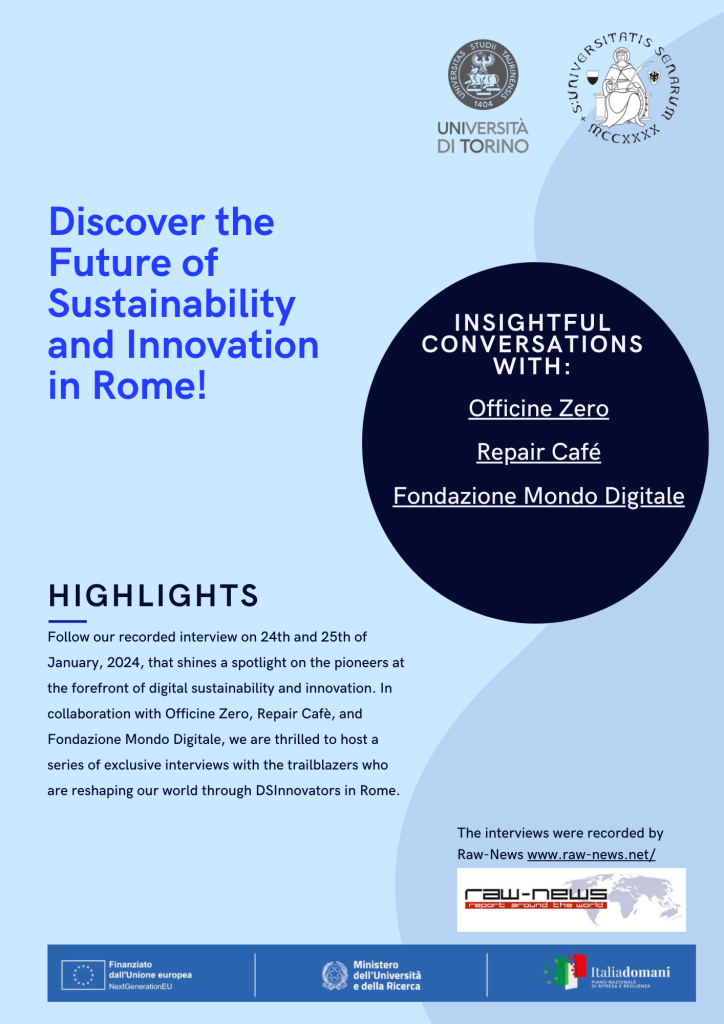[photo C.Certoma’, Exhibition “HelloRobot”, Design Museum Gent]
Digitally-enabled Social Innovation in the City. Implications for urban spaces, societies and governance
DSI in the City is a project funded by MUR-PRIN 2022 led by Chiara Certomà and Venere Sanna (leading research unit University of Siena).
One of the main challenges for contemporary society is to understand and govern the digital revolution and its sociopolitical consequences. It is important to step beyond the a-critical technology and optimism of digital capitalism and ponder the spatial, sociocultural, and political/economic impacts of the pervasive infiltration of digital technologies. These impacts are particularly felt in cities, which serve as hotbeds for the flourishing of digitally-enabled Social Innovation Initiatives (DSIs). DSI encompasses heterogeneous collaborative innovation practices (such as ‘fab-labs’, open software (co)creators, ‘citizen scientists’) in which communities of innovators – whose intentions range from strengthening, reforming or even subverting the neoliberal institutions – adopt digital technologies and internet connectivity to advance knowledge and solutions for a wide range of social needs. From enabling citizen participation, through providing services, to harnessing people’s creativity, DSI initiatives are proliferating and transforming the structural and the operational space of contemporary cities. However, geographical research has devoted limited attention to the relationship between DSI initiatives and urban space, thus preventing us from appreciating the deep sociopolitical implications of the ‘Digital Turn’, including threats for social justice and sustainability. The overall aim of the project is to establish a dedicated theoretical and analytical framework for a critical examination of DSI space and spatialities, to advance critical urban geography research. To this end, after (1) reviewing the existing research on DSI, the project (2) systematically maps existing processes in two selected cases (Turin and Rome) that allow a quantitative and qualitative investigation of the interaction between DSI practices and the city itself; (3) analyses the practices of innovators’ communities in their making, with regard to the social, political, environmental, and cultural space of performance, above and beyond the generated characteristics of these spaces; and (4) identifies and deconstructs the principal issues determined by the digitalisation of urban reproduction processes, notably via the diffusion of DSI practices. To achieve a breakthrough on the above-described objectives, the project proposes a novel mixed-method approach which entails a combination of online and offline data collection techniques (e.g. web-mining, participant observation, and fieldwork), data analysis techniques (e.g. discourse analysis, multi-criteria analysis), and critical interpretation of the evidence generated. In terms of scientific impacts, the project delivers an entirely novel perspective on the nature, characteristics, and dynamics of DSI as a social technology that is shaping contemporary urban space and society; and contributes to the challenge of understanding and governing the vanguard of socio-technical innovation in contemporary cities.
Project activities:
22.09.2023 Internal project meeting, UniTo/UniSi
10.10.2023 Call for paper AAG2024
13/14.11.2023 DSI COST Action Meeting, University of Turin
The core team of the PRIN Project “DSInnovators,” including Chiara Certomà, Venere Sanna, Samantha Cenere, Cristina Viano, and Pouya Sepehr, participated in the highly anticipated Digital Social Innovation (DSI) COST Action Proposal Workshop. This significant event took place on the 13th and 14th of November, 2024, hosted by the esteemed School of Management and Economics at the University of Turin. The workshop brought together leading minds in the field of digital social innovation from across Europe, aiming to foster collaboration, exchange innovative ideas, and lay the groundwork for future projects under the COST Action framework. Our team was honored to contribute our insights and learn from fellow innovators dedicated to making a positive impact through technology. Key Highlights:
- Collaborative Sessions: Chiara, Venere, Samantha, Cristina, and Pouya engaged in productive discussions, exploring the potential for new partnerships and projects that align with our mission to drive sustainable innovation.
- Expert Panels: Members of our team participated in panels, sharing their experiences and strategies for overcoming challenges in the digital social innovation landscape.
- Networking Opportunities: The event provided a unique platform for our team to connect with researchers, practitioners, and policymakers passionate about using digital solutions to address societal challenges.
This participation not only signifies our ongoing commitment to contributing to the global conversation on digital social innovation but also sets the stage for exciting developments in our projects. The insights gained and the connections made during the workshop will undoubtedly enrich our initiatives and help us in our mission to support sustainable digital transformation.

14.11.2023 Kick-Off meeting @UniTo



19.01.2024 Research management and orientation meeting (online). Participants: Chiara Certomà, Venere Sanna, Samantha Cenere, Cristina Viano, Pouya Sepher. Discussion and definition of the preparation of a COST Action proposal as a product of the PRIN.
4-5.12.2023 Interviews with Digital Social Innovators in Turin

24th and 25th of January, 2024 We are thrilled to host a series of exclusive interviews with the trailblazers who are reshaping our world through DSInnovators in Rome. Engage with the minds behind Officine Zero, Repair Café, Fondazione Mondo Digitale as they discuss their groundbreaking work and vision for a sustainable future.

15.02.2024 PRIN project coordination shifted from the University of Turin Dep. ESOMAS to the University of Rome La Sapienza Dep. Memotef (due to the PI change of institutional affiliation). Modification of Research Units: University of Rome La Sapienza research unit includes Chiara Certomà and Massimo Battaglia; University of Siena team includes Venere Sanna and Cristina Capineri.
05.02.2024 The new PRIN DSICity webpage is online hosted by UniSi portal. All news, communication and documentary material will be available from now on at: https://dsicity.unisi.it/


